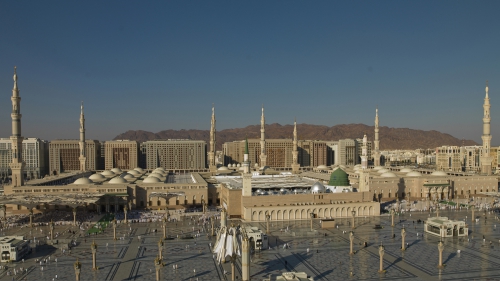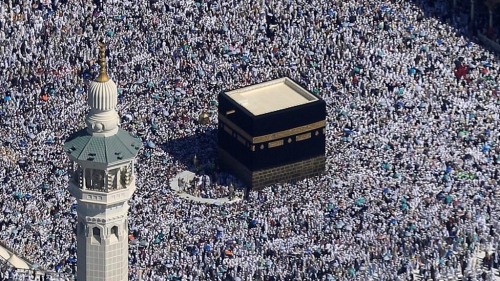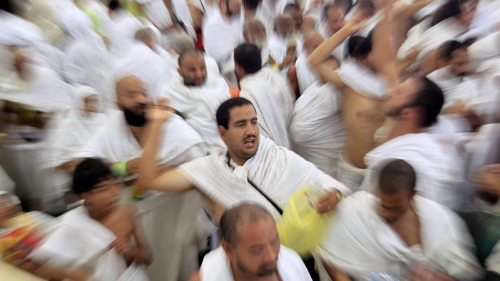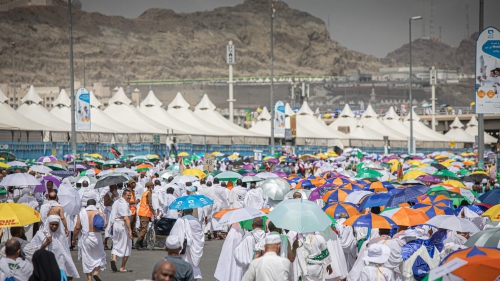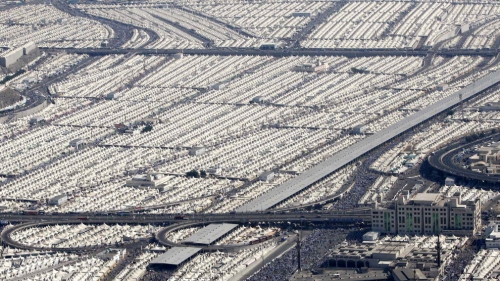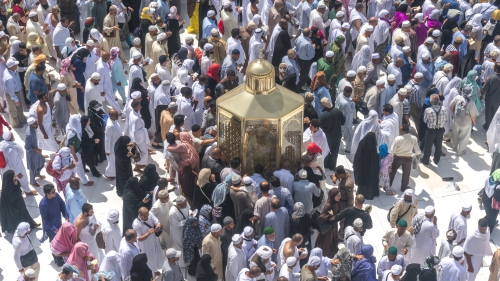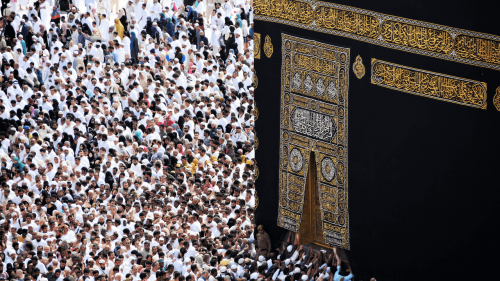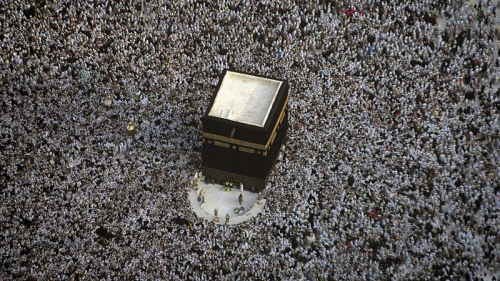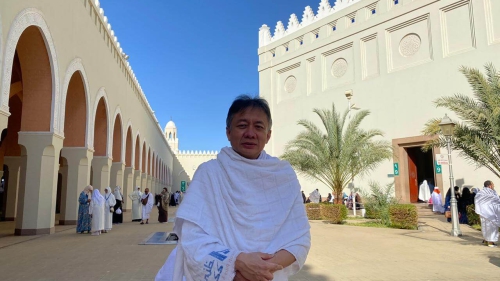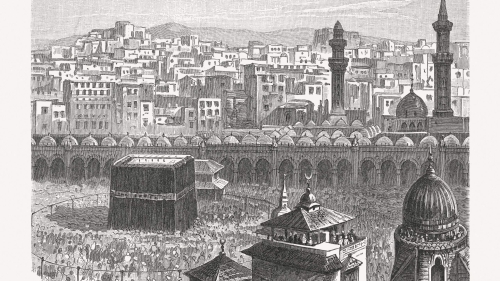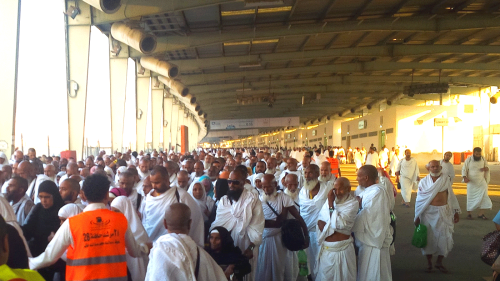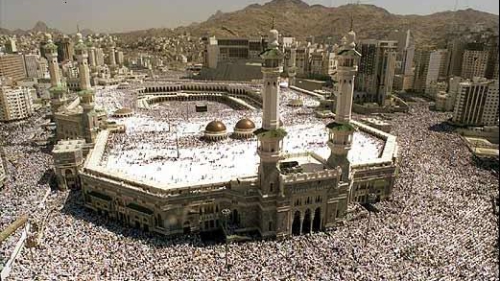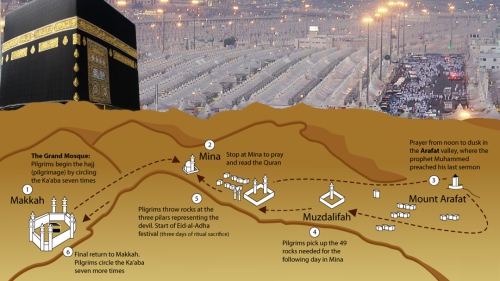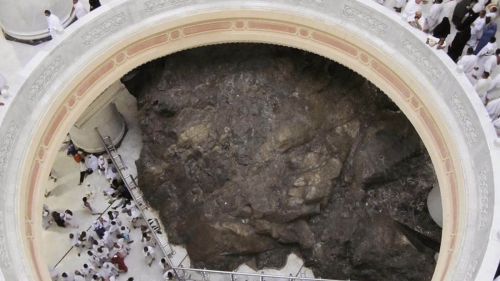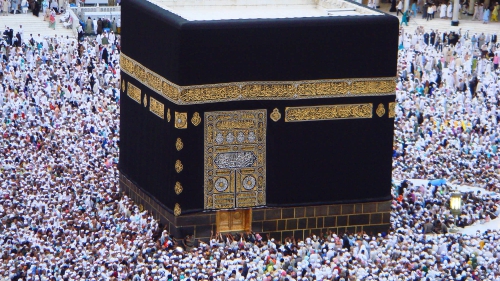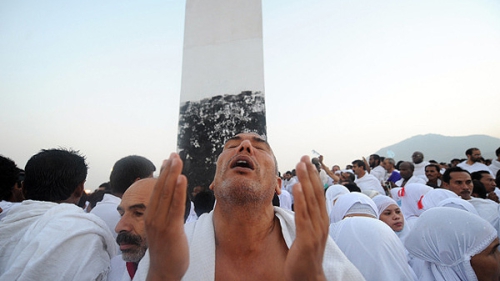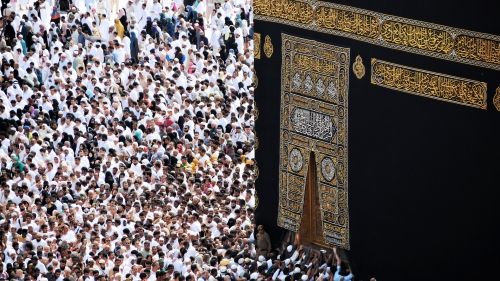Reflections on Limitations of Hajj 2020

The Kingdom of Saudi Arabia, the guardian of the the two holy Muslim shrines, has officially decided to limit the Hajj of the season 1441H/2020, as a consequence of the COVID-19 pandemic.[i] This long-awaited decision comes as the country continues to fight this global viral global affliction. As of 28th July 2020, the kingdom had registered more than 270,000 cases of coronavirus, including 225,000 recovered and 2,789 deaths.
Hajj maintained but drastically limited
The pandemic caused by the new coronavirus is affecting one of the largest religious gatherings in the world : Hajj.[ii] Saudi Arabia announced on Monday (22 June 2020) the continuation of the great Muslim pilgrimage to Makkah, one of the five pillars of Islam, at the end of July. But the number of followers will be limited to 1,000 people of all nationalities "within the Kingdom" of Saudi Arabia, in accordance with precautionary measures to contain the spread of COVID-19.
"The number of pilgrims will be about 1,000, a little less, a little more," Minister of Hajj and Umrah Mohammed Saleh Benten said Tuesday (23 June, 2020) at a press conference. "The number will not reach 10,000 or 100,000," he stressed. The pilgrimage will be limited to worshipers under 65 years of age who are not chronically ill, Health Minister Tawfiq Ben Fawzan Al-Rabiah announced at the same press conference. Pilgrims will be tested before their arrival in the holy city and will have to undergo a domestic quarantine after the end of the ritual, he added.
The Minister of Hajj did not specify the criteria for the selection of those who would be allowed to make the pilgrimage. But he said the Saudi authorities would work closely with diplomatic missions in Riyadh to select these pilgrims. So the Hajj will be allowed for Muslims from all over the world, though symbolically and in a limited number, as a nimble and wise move to keep it happening, in spite of the pandemic and related health risks.
In 2019, the great pilgrimage to the holy city in western Saudi Arabia attracted 2.5 million faithful. The authorities were expecting 2.7 million pilgrims by 2020, according to the ministry in charge of organizing it. This is the first time in the country's modern history that foreign Muslims have had to forego the annual pilgrimage.
The Hajj, the fifth pillar of Islam,[iii] which every worshiper is expected to perform at least once in his or her life if he or she has the means to do so, is performed once a year at the beginning of the Muslim lunar month dhu al-hijja, the last month of the Muslim lunar calendar. On the other hand, the small pilgrimage, or ‘umrah, suspended this year, too, can be made throughout the year.
With huge crowds piling up in holy places in relatively small spaces, the Hajj represents a huge logistical challenge every year. Over the years, this pilgrimage has been plagued by deadly jostling that has led to criticism of the kingdom's management of the pilgrimage. The worst took place in 2015, costing the lives of some 2,300 worshipers, alas.
Limited Hajj for the sake of well-being of Muslims worldwide
The Kingdom of Saudi Arabia, whose top priority is always to enable Muslim pilgrims to perform the rites of Hajj and Umrah in complete safety, has been keen since the beginning of the pandemic to take all the necessary precautionary measures to protect visitors and mu’tamirin (people who do Umrah), suspending the entry of the faithful and ensuring the safety of those already present in the holy places, a decision which has been endorsed by Islamic and international organizations.
In view of the persistence of the pandemic and the risks of spreading the coronavirus in overcrowded areas and large gatherings, its transmission between countries, and the increase in the number of infections in the world, it has been decided that the Hajj for this year (1441 H/2020) will be held, with the participation of a very limited number of pilgrims of various nationalities already residing in Saudi Arabia.
This decision was taken in order to ensure that the Hajj is carried out in a safe manner, from the public health point of view, while observing the preventive measures and social distancing protocols necessary to protect human beings from the risks associated with this pandemic and in accordance with the teachings of Islam, which calls for the preservation of people's lives.
Wise Decision
Sheikh Ahmed at-Tayeb, Egypt's highest Muslim religious dignitary, hailed the Saudi decision as wise, and said it shows Riyadh's awareness of the dangers caused by the virus. Likewise, officials in Indonesia and Afghanistan welcomed the restrictions imposed this year on the Hajj.
Saudi Arabia's borders have been closed to foreigners since the end of February in an attempt to slow the spread of the virus. At the beginning of the year, the government suspended the year-round Umrah pilgrimage, imposed a 24-hour curfew for nearly three months in Makka al-Mukaramah, closed mosques during the holy month of Ramadan, and restricted commercial activities.
The virus causes mild to moderate symptoms in most people, who recover within a few weeks. But it is highly contagious and can cause severe illness or death, especially in elderly patients or those with underlying health problems.
Saudi Arabia said the decision to end the Hajj was aimed at safeguarding global public health because of the risks associated with large gatherings. It also defended its decision on religious grounds, stating that the teachings of Islam require the preservation of human life.
In Afghanistan, retired Colonel Mahmood Seddiqi said Muslims who cannot travel to Saudi Arabia this year should donate the money they would have spent on the pilgrimage to help those most affected by the pandemic and its economic impact. He says it is the will of Allah and it will be best to help your neighbors and those in need.
Hajj disruptions through history
If this is the first time that Saudi Arabia, considered the guardian of Makkah al-Muramah since the country's creation in 1932, has closed the door to all Muslims outside the country, it is certainly not the first time that the Hajj has been interrupted. Since the first official Hajj was led by the Prophet Muhammad, peace be upon him, in 632, the pilgrimage has been subject to wars, famines, diseases, and political interruptions.
Although the recent decision to suspend the Hajj disappoints Muslims who wish to make the pilgrimage, they may refer to a Hadith that gives advice on travel in times of epidemic :[iv]
The Prophet (ﷺ) said :
"If you hear of an outbreak of plague in a land, do not enter it ; but if the plague breaks out in a place while you are in it, do not leave that place."
According to historians at the King Abdulaziz Foundation for Research and Archives (Darah),[v] Hajj has been interrupted at least 40 times since 930, when members of a Shiite sect called the Qarmatians ransacked Makkah al-Mukaramah and murdered 30,000 pilgrims. The Qarmatians also stole and ransomed one of Islam's most precious relics, the Black Stone of the Ka’aba, and the Hajj was suspended for a decade until the stone was returned to Makkah al-Mukarramah.
The plague has been present in the Middle East since the first step of the Arab conquest. In 638, when the Rashidun Caliph Umar ibn al-Khattab entred Syria and Palestine, a terrible plague epidemic ravaged the country. It is referred to by Arab writers as the "Emmaus plague", the village in Palestine where it began to manifest itself. More than 25,000 soldiers were killed. Famine was added the following year, and the momentum of the offensive against the Byzantines was broken. Umar gathered all the military leaders in Sargh and, after a long conference, the opinion of the leaders of the tribe of Quraysh (the tribe of the Prophet (pbuh)) is adopted.
Referring to the Prophet's prohibition to enter a territory where there is an epidemic, they advised withdrawing the army from all infected areas. Abu Oubaydah, head of the armies, protested, but finally submitted : he withdrew his troops from Syria and waited in the desert until the epidemic has stopped before resuming the offensive. Umar's decision, known as the Avoidance Decision, was a crucial one because it was to serve as a reference point and condition the general attitude of Muslims towards the plague for centuries. It is interpreted today by some Muslim authors as one of the first applications of isolation.[vi]
In the space of almost twenty years, the Hajj was suspended three times, preventing pilgrims from reaching Makkah for seven years. First in 1837, when another epidemic struck the Holy City, suspending the pilgrimage until 1840.
Then, in 1846, an outbreak of cholera struck Makkah al-Mukaramah, killing more than 15,000 people and tormenting its inhabitants until 1850. Epidemic outbreaks resumed in 1865 and 1883.
In 1858, another global cholera pandemic struck the city, prompting Egyptian pilgrims to flee en masse to the Egyptian Red Sea coast, where they were kept in quarantine.
Since the first outbreak of cholera in Makkah Al-Mukarramah in 1831 (the year in which the first basic health regulations for the pilgrimage were established, including the introduction of quarantines on pilgrim ships), more than 30 epidemics have occurred, including the 1865 epidemic, which killed one third of the 90,000 pilgrims[vii] and the 1893 epidemic, which killed one sixth of the 201,963 pilgrims.[viii]
In 2003, SARS infected 8,273 people, mainly in Asia.[ix] Infectious disease surveillance is increasingly being taken into account by the Saudi Arabian authorities as they responded to the H1N1 influenza pandemic in 2009 and the MERS-CoV pandemic in 2013.
For Saudi Arabia, the Covid-19 crisis is just another episode in a long series of viruses which have struck the Kingdom since the Spanish flu of 1919.
On the history of epidemics in Arabia, Philippe Pétriat[x] writes in Orient XXI an article entitled : “The Painful History of Epidemics in Saudi Arabia“ :[xi]
“In the 18th and 19th century Arabic chronicles from the peninsula, epidemics appear as frequently as locust attacks on crops. Plague, especially smallpox and cholera and all coming under the generic appellation of ta’un or waba’, penetrated the peninsula via the ports of the Gulf and the Hejaz. The diseases spread through the movement of pilgrims towards Medina and Mecca, of merchant caravans, or through the migration of Bedouin tribes. They are sometimes described as a divine punishment, but more often seen as a recurrent inevitability of nature and of the numerous contacts linking the societies and economies of the Peninsula to the rest of the world“.
As the number of recorded COVID-19 cases rose during March 2020, the Saudi press produced a number of articles on the 20th century’s first pandemic, the so-called Spanish flu of 1918–1919. The Kingdom’s editorials drew many more or less scientific comparisons between the two public health crises. The earlier episode had not been forgotten, as it was a formative moment in the emergence of Saudi Arabia.
On this particular episode, Philippe Pétriat writes in the above-mentioned article :[xii]
“Spanish flu struck the central Najd region and the neighbouring emirates for three months in 1919. It was so virulent that Saudi historians of the period, and surviving folk memories, describe that time as “the year of compassion” (sanat al-rahma) or of “fever” (al-sakhna). In the towns, the daily death toll ran into dozens - in Riyadh, 100 a day at the height of the pandemic, and around 25,000 altogether in the towns of central Arabia, according to the British explorer and Saudi adviser H. St John Philby. The flu decimated nomadic groups already hard hit by a harsh drought and the paralysis of trade during the First World War. It aggravated their distress and stirred the first revolts of the famous Ikhwan [note] against the Emir Abdulaziz Ibn Saud at a time when he was setting about some difficult conquests in northern Najd (an emirate of the Āl Rashid of Ha’il) and in the Hejaz (the Hashemite Kingdom of Mecca). “
On the current limitation of Hajj, Mustafa Abu Sneineh writes in The Middle East Eye:[xiii]
“Though Hajj has been cancelled several times over the centuries, since the Kingdom of Saudi Arabia's foundation in 1932 it has never missed a year, nor even during the Spanish flu pandemic of 1917-18 that killed millions of people worldwide. But if Saudi Arabia cancels 2020's Hajj, it will be added to a list of almost 40 dramatic cancellations since the first in 629. Middle East Eye takes a look at some of the most striking cancellations in history. “
The Hajj has experienced major disruptions in recent years, including a deadly stampede and the collapse of a crane in 2015, which killed more than 2,500 people. In 1987, Saudi security forces killed more than 400 people, mostly Shia Muslims, in a clash provoked by Iranian pilgrims demonstrating during the Hajj.
The most spectacular closure of the Great Mosque of Makkah al-Mukaramah, however, took place in 1979, when religious extremists stormed Islam's holiest site, which houses the cube shaped Ka'aba to which Muslims pray and which they circulate during the pilgrimage. Thousands of worshipers were trapped inside and hundreds were killed in a two-week siege.
The importance, virtues, merits, and benefits of the Hajj pilgrimage [xiv]
On the importance of Hajj pilgrimage for Muslims,[xv] Allah said :
"And it is a duty to Allah for people who can afford to go on pilgrimage to the House." (Surah 3, Verse 97.)
The Prophet Muhammad (pbuh) said :
"He who makes the pilgrimage without committing fornication or sin, will return as it was the day his mother gave birth to him," (Reported by Al-Bukhâri and Muslim.)
He also says :
"The expense incurred during the pilgrimage is 700 times that made for the love of God."
According to Ibn Abbas - may Allah be pleased with him - the Envoy of Allah said :
"He who has resolved to make the pilgrimage, let him hasten to do so...for he may fall ill, lose his mount, or be confronted with something unexpected," (Reported by Ibn Mâjah, al-Hâkim and Abu Dâwud.)
The Prophet Muhammad (pbuh), further said :
"Pilgrims and those who perform the 'Umrah are guests of Allah : If they call upon Him, He answers them and if they ask for His forgiveness, He grants it to them," (Reported by Ibn Mâjah.)
Pilgrimage is one of the pillars of the Muslim religion. It has merits and benefits that are not always understood.[xvi]
Among the merits are the following :
1-Reminding believers of the Day of Resurrection because they leave their families, their possessions and their place of residence to gather in one place called Arafat. They are thus cut off from their ties to the life of this world, regret their sins, fear Allah and submit to Him.
2-The abolition of all differences between human beings to be all on the same level. The powerful and the weak are on the same level. They have only one goal, which is to beg Allah's forgiveness and to gain His satisfaction. There is no difference between them except by Faith.
3-The possibility for women to obtain the reward of Jihad according to the Prophet (pbuh)'s Hadith reported by Aicha (may Allah be pleased with her) who says :
"I was asking : O Messenger of Allah ! Should not women (also) perform Jihad ? The Prophet (pbuh) replied : "Yes, they must perform a jihad without battle : the Pilgrimage and the 'Umrah," (Reported by Ahmad and Ibn Mâjah.)
The Prophet Muhammad (pbuh) says in another Hadith :
"The Pilgrimage and the 'Umrah (constitute) the Jihad of the old, the child, the weak and the woman," (Reported by An-Nassâi and Ibn Mâjah.)
4-The education of souls by learning patience in the way of Allah because the Pilgrim sometimes has to perform difficult tasks in times of great affluence.
5-The possibility of thanking God for the two things He has given to man in the world : money and health.
6-The demonstration of humility and submission to Allah since the pilgrim remembers the story of the Prophet Ibrâhîm (On him is blessing and peace) who, in order to obey God, abandoned his family in the middle of the desert.
Hajj can be performed otherwise for those who can't afford it
Although pilgrimage is not obligatory for those who cannot afford it, it is certain that every believer hopes with all his heart to make this spiritual journey and go to the house of Allah where all invocations are answered.
The journey to Makkah al-Mukaramah in order to accomplish the pilgrimage is the fifth pillar of Islam. It is much more than a journey, a spiritual quest ! Every Muslim dreams of going there, of praying in front of the Ka'aba and tasting this unique happiness. However, the reality here below quickly calls us to order and shows us that this dream comes at a cost, sometimes unimaginable for people in need and without great financial resources.
The first ten days of dhu al-hijja are the ten best days of the year as they mark the beginning of the sacred Hajj pilgrimage. The spiritual rewards during these ten days are tenfold. The Prophet (pbuh) said :
"There are no days that are greater before Allah or in which good deeds are more beloved to Him, than these ten days. So recite a great deal of tahleel, takbeer and tahmeed during them." [xvii] [Ahmad, 7: 224]
Since we cannot go to Hajj this year due to the pandemic, there are many ways to receive the blessings that come from this blessed month : doing good deeds, acts of charity (sadaqah) to help the needy, and repentance bring infinite rewards to the faithful. Also, fasting and prayers during this month are another way to obtain the grace of Allah.
Remember that even if you do not go to Hajj, for one reason or another, the purchase of a sheep, fasting, prayer, and doing good deeds will bring you many, many rewards and the grace baraka and blessings of Allah, the Merciful and the Compassionate.
Islamic religion is about how you treat the other : “ad-dîn al-mu’amala“
Has not the Prophet of Islam Muhammad (pbuh) said :
"None of you believes until he wishes for his brother what he wishes for himself," (An-Nawawi’s Forty Hadith, 13.)
Even if you are not physically in Hajj, as a good Muslim you can maximize Arafat's blessings at home and in your own community and surrounding, especially by helping the poor and the needy of the Ummah.
Indeed, Arafat's day is the best day of the whole year and its benefits are for all Muslims, wherever they are. It is an opportunity to cleanse ourselves of our past sins and to receive infinitesimal spiritual rewards for our good deeds, mu’amala. Remember, this opportunity only comes once a year ! Why is Arafat's day so special ? It is an important day because :
1. The religion of Islam was perfected on Arafat's day.
2. It is when the Prophet Muhammad (pbuh) gave his farewell sermon.
3. It is a day by which Allah mentions in the Qur’an.
4. Millions of people around the world will fast to see their sins of the previous year and the year to come erased.
5. It is when Allah came down to the sky nearest to the earth and said :
“When My servants ask you ˹O Prophet˺ about Me : I am truly near. I respond to one’s prayer when they call, “ (Surah 2, Verse 186.)
The first ten sacred days of dhu al-hijja are an inescapable opportunity to do good around you and reap the rewards of Allah, whether you go to Hajj or worship in your home. Enjoy every precious moment of these ten days.
The Prophet (pbuh) was questioned about the fast on the day of Arafat. He answered :
"Fasting three days every month and that of Ramadan every year is a perpetual fasting. I seek from Allah that fasting on the day of Arafa may atone for the sins of the preceding and the coming years, and I seek from Allah that fasting on the day of Ashura may atone for the sins of the preceding year," (Reported by Muslim 11 : 62.)[xviii]
Arafat's day is the best time to fast, repent, make invocations, and donate to charity. So, pious people must not miss this golden opportunity. By making a donation on this holy day, they can be sure that a desperately needy family will receive fresh meat as a gift for ‘Eid al-Adha, and in return they will, undoubtedly, receive countless spiritual rewards : Hassanât !
Perform good deeds during the first ten days of dhu al-hijja
A period that Islam has favored in particular is the first ten days of the 12th month of the Muslim calendar, the month of dhu al-hijjah, during which the pilgrimage to Makkah al-Mukaramah takes place. Ten days on which God has conferred superiority and special merit over the rest of the days of the year.
According to Ibn Abbâs, the Messenger of God (Allah grant him blessing and peace) said :
"There are no days on which good deeds are more beloved of God than on these days." He meant the first ten days of Dhul-Hijjah. Someone asked, "Not even the fighting in the way of God ?" The Prophet replied, "Not even the struggle in the way of God, unless a man dedicates his person and property to it and does not return." (Reported by Al-Bukhârî.)
This Hadith, as well as other sources, show that these ten days are the best of the year, with the exception of the Night of Destiny - Laylatu al-Qadr - which is one of the nights of the last decade of the month of Ramadan, and which is better than a thousand months.
God, the Merciful, created time and gave special merit to certain times of the year, so that worshipers may take advantage of these opportunities to increase their good deeds, and come closer to their Creator. And also to make up for their shortcomings in the past, and to expose themselves to the breath of mercy that pours out during those privileged hours and days.
A Muslim should be aware of the value of his life and the time he is given to live: this naturally leads him to increase his religious actions, and to perform works of good until his death.
Allah, the Most High, has said :
"And worship your Lord until you are sure (al-yaqîn)," (Qur'an, Surah 15: Verse 99).[xix]
Al-yaqîn, certainty, here means, as the commentators have explained, death, al-mamat.
So, the good deeds to perform during these special ten days of dhu al-hijja are as follows :
Sincerely repenting: especially during those days, by departing from sins and rejecting all the faults that Allah does not love, whether apparent or hidden. Regretting past mistakes, immediately and without delay, and making a firm resolution not to return to them. It is incumbent on the Muslim who commits an act of disobedience to repent immediately and without delay, first because he does not know when he will die, and second because evil calls for evil, and a persistent error leads us to another error.
Increasing actions of good in general: for these deeds are loved by God in these days, which means they are greatly rewarded. Therefore, whoever is unable to go on Hajj pilgrimage, let him fill his time with prayer, reading the Qur'an, dhikr (the remembrance and evocation of God), invocation, almsgiving sadaqa, kindness to father and mother mu’amala tayyiba or birr al-walidayn, respect for family ties, ordering good and forbidding evil, and every good work ‘amalu al-iHsan.
Glorifying God: saying subhân Allah (glory to God), al-hamdu li-Llâh (praise to God), la ilah illa -Llâh (there is no god but God), and Allahu Akbar (God is greater). It was reported that 'Abd-Allah Ibn 'Umar and Abû Hurayra - may God be pleased with them - went to the market during those ten days and said aloud : Allahu Akbar (God is greater), and then the people repeated with them : Allahu Akbar. This practice is a sadly forgotten tradition, which should be recalled and put back on the agenda.
Fasting: Muslims are advised to fast for the first 9 days of this month. The Prophet (pbuh) has indeed recommended that we should perform good deeds during this period, and fasting is one of the best deeds, which Allah has chosen for Himself, as it is reported in the Hadith qudsi.
Allah's Messenger (ﷺ) said:
"Allah said, 'All the deeds of Adam's sons (people) are for them, except fasting which is for Me, and I will give the reward for it.' Fasting is a shield or protection from the fire and from committing sins, “ (Reported by Al-Bukhâri, 30: 14.)[xx]
The Messenger of Allah (Allah grants him blessing and peace) fasted himself on the first nine days of the month of dhu al-hijja regularly. One of the Prophet's wives said:
"The Prophet fasted on nine days in the month of Dhu'l-Hijjah and on the day of Ashura (the 10th of the month of Muharram), and three days each month, as well as on the first Monday of the month and two Thursdays," (This Hadith is reported by An-Nasa'i and Abu Dawud and it has been authenticated by Al-Albani.)
Almsgiving (sadaqa) is a community Hajj
Almsgiving (sadaqat) meaning "generous works" appears in the Qur'an very frequently. It can also be considered as a form of community Hajj because it helps the poor and the needy and creates a sense of solidarity within the Islamic community in which sharing is an expression of the concept: religion is responsibility to the community : ad-din al-mu’amala.
In fact, Islam recommends that Muslims always act by doing good not only by giving themselves but also by giving their goods. The verses of the Qur’ân and the Hadiths of the Prophet (pbuh) which put forward the merits of almsgiving are very numerous:
He who gives alms will have the blessing (baraka) in his goods as the Prophet (pbuh) says :
"No fortune has been diminished by a gift."
Almsgiving mitigates the wrath of Allah as the Prophet (pbuh) says :
"Discreet almsgiving extinguishes the wrath of Allah exalted be it."
Almsgiving extinguishes sins and cancels the fire that they cause as the Prophet (pbuh) further says:
"... and almsgiving extinguishes sin as water extinguishes fire."
Because he who practices sadaqah will be protected by the shadow of his alms on the Day of Judgment as the Prophet (pbuh) said:
“There are seven whom Allah will shade in His Shade on the Day when there is no shade except His Shade: a just ruler; a youth who grew up in the worship of Allah, the Mighty and Majestic; a man whose heart is attached to the mosques; two men who love each other for Allah's sake, meeting for that and parting upon that; a man who is called by a woman of beauty and position [for illegal intercourse], but be says: 'I fear Allah'; a man who gives in charity and hides it, such that his left hand does not know what his right hand gives in charity; and a man who remembered Allah in private and so his eyes shed tears.” [Reported by Al-Bukhari and Muslim.][xxi]
Sadaqah is a remedy against diseases as indicated in the words of the Prophet (pbuh) :
"Heal your sick with alms and strengthen your money with alms ..."
Human being will attain true piety only by practicing almsgiving as Allah exalted says :
“By no means shall you attain Al-Birr (piety, righteousness, etc., it means here Allah's Reward, i.e. Paradise), unless you spend (in Allah's Cause) of that which you love ; and whatever of good you spend, Allah knows it well. “ (Surah 3, Verse 92.)[xxii]
Allah will double the reward to the one who gives alms as He says in His Sacred Book :
“Verily, those who give Sadaqat (i.e. Zakat and alms, etc.), men and women, and lend to Allah a goodly loan, it shall be increased manifold (to their credit), and theirs shall be an honorable good reward (i.e. Paradise).“ (Surah 57, Verse 18.)[xxiii]
And when Allah says, also,:
“Who is it that would loan Allah a goodly loan so He may multiply it for him many times over ? And it is Allah who withholds and grants abundance, and to Him you will be returned.“ (Surah 2, Verse 245.)[xxiv]
The first person to benefit from a charitable action is the actor himself, and showing generosity to others brings personal satisfaction.
Doing a Sadaqah can change the state of heart of the pious Muslim, making it more sincere and attentive to acts of kindness. Sadaqah also makes it possible to give without expecting anything in return, because one knows that Allah will reward him for it.
One must always be kind to others, for if one finds himself in a situation of distress, he will be the first to find consolation and well-being. Giving to the needy, defending the oppressed, helping those in difficulty and visiting the sick : one will be overwhelmed with blessings. An act of charity is like perfume : it benefits the user, the seller and the buyer. Moreover, the positive psychological aspects observed after such acts are impressive. If one suffers from depression, an act of charity will be much more beneficial than a prescribed medication.
Sadaqah is not just about money. Passing on one's knowledge to others, giving sincere advice or helping a person can be considered a Sadaqah. In Islam, the simple act of greeting a brother or sister is seen as a form of giving. If you wish to help the needy throughout the world, you can also do so by getting involved in an association and becoming a volunteer.[xxv]
Coclusion: Community-based Hajj
It must be said that fulfilling the five pillars of Islam (arkan al-islam al-khamsa) is the wish of every pious Muslim, but whereas the first four are obligatory, the Hajj tenet is optional though preferred (mustaHabb) for every faithful who has the financial means and the required health. For those who cannot make it, there are, indeed, multiple possibilities to undertake, what we might call, community-based Hajj because Islam is, definitely, a religion of facility (yusr) and not difficulty (‘usr).
For those Muslim faithful who cannot make the Hajj this year because of the pandemic and have already expressed the intention to do it (niyya), they can, if they want, undertake a community-based Hajj by doing the following actions :
- Help the needy by making to them money donations sadaqah to buy food, clothing, medicine and daily needs. Islam is a religion of egalitarianism in which all Muslims are equal and highly motivated by sharing and community solidarity.
- Help open a Qur’anic school (madrasah) to teach the children of Muslims Qur’an, Hadith, Seerah and Sunnah, especially in non-Muslim countries where Islam rhymes with religious identity and social responsibility.
- Help build a mosque to allow Muslims to pray but also to meet and discuss community needs and obligations and accomplish celebrations.
- Finance mosque-based literacy programs : a mosque is not only a house of Allah for prayer, it can also be used as a community center to meet, celebrates religious feasts and gatherings, and teach members of the community. Alas, our Muslim world, the community of Iqra’, is riddled with the scourge of illiteracy which can be easily combated through teaching reading, writing and math)in mosques precincts. Experience has shown the popularity of these actions in Morocco and Sahel countries, especially among women and young girls who did not have the chance to go to school.
- Support vocational education in mosque precincts, help the youth learn a trade to become financially independent and useful community members ; etc.
These are some of the many community-based actions that a Muslim can finance or undertake to help his local community progress and develop in accordance with the teachings of the Holy Qur’an :
“Righteousness is not that you turn your faces toward the east or the west, but [true] righteousness is [in] one who believes in Allah , the Last Day, the angels, the Book, and the prophets and gives wealth, in spite of love for it, to relatives, orphans, the needy, the traveler, those who ask [for help], and for freeing slaves; [and who] establishes prayer and gives zakah; [those who] fulfill their promise when they promise; and [those who] are patient in poverty and hardship and during battle. Those are the ones who have been true, and it is those who are the righteous. “ (Surah 2, Verse 177.) [xxvi]
Endnotes :
[i] Cf. Chtatou, M. 2020. “Les conséquences religieuses et économiques de la limitation du Hajj 2020“, in Oumma du 26 juin 2020. https://oumma.com/les-consequences-religieuses-et-economiques-de-la-limitation-du-hajj-2020/
[ii] While almost all religions have pilgrimages, in no other religion have they attained the importance that the pilgrimage to Mecca (ẖajj) has in the Islamic religion.
[iii] The five pillars of Islam (arkân al-islâm) are called the fundamental practices that a Muslim must perform. There are traditionally five of them: profession of faith shahâda (A), canonical prayer salât (C), fasting in the month of ramaḏân siyyâm (D), legal almsgiving zakât (E), and pilgrimage to Mecca Hajj (F). Since the Muslim should perform his prayer only in a state of purity, the study of purity and ablutions wûdû’ should be interspersed before prayer (B).
[iv] https://sunnah.com/bukhari/76/43
حَدَّثَنَا حَفْصُ بْنُ عُمَرَ، حَدَّثَنَا شُعْبَةُ، قَالَ أَخْبَرَنِي حَبِيبُ بْنُ أَبِي ثَابِتٍ، قَالَ سَمِعْتُ إِبْرَاهِيمَ بْنَ سَعْدٍ، قَالَ سَمِعْتُ أُسَامَةَ بْنَ زَيْدٍ، يُحَدِّثُ سَعْدًا عَنِ النَّبِيِّ صلى الله عليه وسلم قَالَ " إِذَا سَمِعْتُمْ بِالطَّاعُونِ بِأَرْضٍ فَلاَ تَدْخُلُوهَا، وَإِذَا وَقَعَ بِأَرْضٍ وَأَنْتُمْ بِهَا فَلاَ تَخْرُجُوا مِنْهَا ". فَقُلْتُ أَنْتَ سَمِعْتَهُ يُحَدِّثُ سَعْدًا وَلاَ يُنْكِرُهُ قَالَ نَعَمْ.
[vi] Cf. Biraben, J.-N. 1977. “ La Peste Noire en terre d'Islam“, in L'Histoire n°11 d’avril 1977. https://www.lhistoire.fr/la-peste-noire-en-terre-dislam
[vii] The participants of the Constantinople International Health Conference of 1866 acknowledged the central role played by the pilgrimage in this matter and advocated strict health regulations.
[viii] Cf. Duguet, F. (1932). Le Pèlerinage de La Mecque au point de vue religieux, social et sanitaire. Paris : Éditions Rieder, p. 337.
[ix] Cf. Mbacké, K. (2004). Le pèlerinage aux lieux saints de l'Islam. Dakar : Presses universitaires de Dakar, p. 422.
[x] Lecturer (University Paris 1 Panthéon-Sorbonne) and researcher at the Institute of Modern and Contemporary History (IHMC and at the French Centre for Archaeology and Social Sciences (Cefas)).
[xi] Cf. Pétriat, P. “ The Painful History of Epidemics in Saudi Arabia,“ in : Orient XXI of May 21, 2020. https://orientxxi.info/magazine/the-painful-history-of-epidemics-in-saudi-arabia,3895
[xii] Ibid.
[xiii] Cf. Abu Sneineh, M. 2020. “ Plagues, politics and conflict : Hajj cancellations over the centuries, “ in The Middle East Eye of April 1, 2020. https://www.middleeasteye.net/news/coronavirus-saudi-arabia-muslims-hajj-cancel-pilgrim
[xiv] Cf. Nigosian, S. A. (2004). Islam : Its History, Teaching, and Practices. Bloomington, Indiana : Indiana University Press
[xv] Unlike other pilgrimages in Islam and other religions, which have developed over the centuries, the pilgrimage to Mecca was instituted directly by the Prophet following the Battle of Badr. This is the time when he broke with the Jews and put the emphasis on Abraham, the father of monotheism, the founder of pilgrimage according to the Koran (2: 196-203, 3: 97, 9: 37, 22: 27-31). Muslim interest then turned to Mecca where the Ka'ba is said to have been built by the patriarch.
[xvi] The pilgrimages to Medina and Jerusalem are not mentioned in Islamic law : they are only customary.
[xvii] Tahleel: Laa ilaha ill-Allah (There is no god but Allah) Takbeer : Allahu akbar (God is most great) Tahmeed : Al-Hamdo Lillah (All praises be to God).
[xviii] https://sunnah.com/muslim/13/252
(36)
باب اسْتِحْبَابِ صِيَامِ ثَلَاثَةِ أَيَّامٍ مِنْ كُلِّ شَهْرٍ وَصَوْمِ يَوْمِ عَرَفَةَ وَعَاشُورَاءَ وَالِاثْنَيْنِ وَالْخَمِيسِ
ثُمَّ قَالَ رَسُولُ اللَّهِ صلى الله عليه وسلم " ثَلاَثٌ مِنْ كُلِّ شَهْرٍ وَرَمَضَانُ إِلَى رَمَضَانَ فَهَذَا صِيَامُ الدَّهْرِ كُلِّهِ صِيَامُ يَوْمِ عَرَفَةَ أَحْتَسِبُ عَلَى اللَّهِ أَنْ يُكَفِّرَ السَّنَةَ الَّتِي قَبْلَهُ وَالسَّنَةَ الَّتِي بَعْدَهُ وَصِيَامُ يَوْمِ عَاشُورَاءَ أَحْتَسِبُ عَلَى اللَّهِ أَنْ يُكَفِّرَ السَّنَةَ الَّتِي قَبْلَهُ " .
وَاعْبُدْ رَبَّكَ حَتَّىٰ يَأْتِيَكَ الْيَقِينُ
[xx] https://sunnah.com/bukhari/30/14
حَدَّثَنَا إِبْرَاهِيمُ بْنُ مُوسَى، أَخْبَرَنَا هِشَامُ بْنُ يُوسُفَ، عَنِ ابْنِ جُرَيْجٍ، قَالَ أَخْبَرَنِي عَطَاءٌ، عَنْ أَبِي صَالِحٍ الزَّيَّاتِ، أَنَّهُ سَمِعَ أَبَا هُرَيْرَةَ ـ رضى الله عنه ـ يَقُولُ قَالَ رَسُولُ اللَّهِ صلى الله عليه وسلم " قَالَ اللَّهُ كُلُّ عَمَلِ ابْنِ آدَمَ لَهُ إِلاَّ الصِّيَامَ، فَإِنَّهُ لِي، وَأَنَا أَجْزِي بِهِ. وَالصِّيَامُ جُنَّةٌ، وَإِذَا كَانَ يَوْمُ صَوْمِ أَحَدِكُمْ، فَلاَ يَرْفُثْ وَلاَ يَصْخَبْ، فَإِنْ سَابَّهُ أَحَدٌ، أَوْ قَاتَلَهُ فَلْيَقُلْ إِنِّي امْرُؤٌ صَائِمٌ. وَالَّذِي نَفْسُ مُحَمَّدٍ بِيَدِهِ لَخُلُوفُ فَمِ الصَّائِمِ أَطْيَبُ عِنْدَ اللَّهِ مِنْ رِيحِ الْمِسْكِ، لِلصَّائِمِ فَرْحَتَانِ يَفْرَحُهُمَا إِذَا أَفْطَرَ فَرِحَ، وَإِذَا لَقِيَ رَبَّهُ فَرِحَ بِصَوْمِهِ ".
[xxi] https://www.islamweb.net/en/article/135625/the-seven-under-the-shade-of-allah-almighty-i
[xxii] https://quran.com/3/92?translations=18,19,20,21,84,95
لَن تَنَالُوا الْبِرَّ حَتَّىٰ تُنفِقُوا مِمَّا تُحِبُّونَ وَمَا تُنفِقُوا مِن شَيْءٍ فَإِنَّ اللَّهَ بِهِ
عَلِيمٌ
[xxiii] http://corpus.quran.com/translation.jsp?chapter=57&verse=18
إِنَّ الْمُصَّدِّقِينَ وَالْمُصَّدِّقَاتِ وَأَقْرَضُوا اللَّهَ قَرْضًا حَسَنًا يُضَاعَفُ لَهُمْ وَلَهُمْ أَجْرٌ كَرِيمٌ
[xxiv] https://www.islamawakened.com/quran/2/245/default.htm
مَّن ذَا الَّذِي يُقْرِضُ اللَّهَ قَرْضًا حَسَنًا فَيُضَاعِفَهُ لَهُ أَضْعَافًا كَثِيرَةً وَاللَّهُ يَقْبِضُ وَيَبْسُطُ وَإِلَيْهِ تُرْجَعُونَ
[xxv] Cf. Chtatou, M. 2019. “Solidarity and Sharing in the Arab-Islamic World, “ in Eurasia Review of September 12, 2019. https://www.eurasiareview.com/12092019-solidarity-and-sharing-in-the-arab-islamic-world-analysis/
[xxvi] http://corpus.quran.com/translation.jsp?chapter=2&verse=177
References :
Abu Sneineh, M. (2020). “ Plagues, politics and conflict : Hajj cancellations over the centuries, “ in Middle East Eye of April 1, 2020. https://www.middleeasteye.net/news/coronavirus-saudi-arabia-muslims-hajj-cancel-pilgrim
Bianchi, Robert R. (2004). Guests of God : Pilgrimage and Politics in the Islamic World. Oxford : Oxford University Press.
Biraben, J.-N. (1977). “La Peste Noire en terre d'Islam“, in L'Histoire n°11 d’avril 1977. https://www.lhistoire.fr/la-peste-noire-en-terre-dislam
Chtatou, M. (2020). “Les conséquences religieuses et économiques de la limitation du Hajj 2020“, in Oumma du 26 juin 2020. https://oumma.com/les-consequences-religieuses-et-economiques-de-la-limitation-du-hajj-2020/
Chtatou, M. (2019). “Solidarity and Sharing in the Arab-Islamic World, “ in Eurasia Review of September 12, 2019. https://www.eurasiareview.com/12092019-solidarity-and-sharing-in-the-arab-islamic-world-analysis/
Duguet, F. (1932). Le Pèlerinage de La Mecque au point de vue religieux, social et sanitaire. Paris : Éditions Rieder.
Hammoudi, Abdellah (2006). A Season in Mecca : Narrative of a Pilgrimage. New York City : Hill and Wang.
Khan, Qaisra, "Hajj & 'Umra", in : Muhammad in History, Thought, and Culture : An Encyclopedia of the Prophet of God (2 vols.), edited by C. Fitzpatrick and A. Walker, Santa Barbara, ABC-CLIO, 2014, Vol. I, pp. 239–245.
Mbacké, K. (2004). Le pèlerinage aux lieux saints de l'Islam. Dakar : Presses universitaires de Dakar.
Nigosian, S. A. (2004). Islam : Its History, Teaching, and Practices. Bloomington, Indiana : Indiana University Press.
Patler, N. (2017). “From Mecca to Selma : Malcolm X, Islam, and the Journey tnto the American Civil Rights Movement. “ In : The Islamic Monthly. http://theislamicmonthly.com/mecca-to-selma/
Pétriat, P. (2020). “ The Painful History of Epidemics in Saudi Arabia, “ in : Orient XXI of May 21, 2020. https://orientxxi.info/magazine/the-painful-history-of-epidemics-in-saudi-arabia,3895
Trojanow, Ilija (2007). Mumbai to Mecca : A Pilgrimage to the Holy Sites of Islam. London : Haus Publishing.






